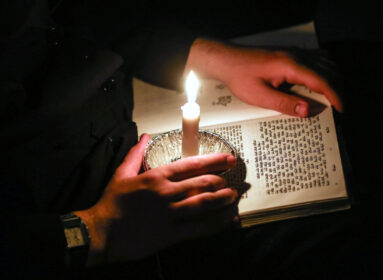By Binyamin Kagedan/JNS.org
The great epic poet Homer once said, “For rarely are sons similar to their fathers; most are worse, and a few are better.” In honor of Father’s Day 2013, JNS.org compiled some quick facts about some rather un-famous (though not all infamous) fathers of famous biblical characters.
Terah, father of Abraham
The biblical verse is mostly silent on Terah’s life and times, its brief description of his family and travels serving only to set the stage for the story of Abraham. But various ancient interpretive traditions grew around the character of Terah in the imagination of the rabbis, especially as they pertain to the spiritual evolution of Abraham. Terah is portrayed in the Midrash as a typical worshipper of Mesopotamian gods, perhaps even a priest, who kept a sizable collection of stone idols. His precocious son Abraham, so the familiar tale goes, having become convinced of the powerlessness of these images, smashed all but the biggest one to pieces, then left his hammer in the remaining statue’s hands. When a furious Terah later demanded an explanation for the disaster, Abraham cleverly blamed the one idol he’d left standing, claiming that a fight had erupted in which it was the sole victor!
Elkanah, father of Samuel
Elkanah had two wives, like many men of his day, but had only been able to have children with one of them. The biblical narrator tells us that it was his other wife, Hannah, who was his favorite of the two. Hannah was greatly depressed by her infertility, and Elkanah, in what is perhaps one of the earliest accounts of male insensitivity, responds: “Hannah, why do you weep? And why do you not eat? And why does your heart grieve? Am I not better to you than ten sons?” (I Samuel 1:8). In fact, having a son was so important to Hannah that she made deal with God: If she would be granted a son, she offered to permanently lend him to the service of the divine. Thus Samuel, when he came of age, became the servant of the High Priest Eli, and grew to be one of the great prophets of Israel.
Jesse, father of David
The importance of the genealogy of David to both Jewish and Christian messianic thought has helped make Jesse a more familiar name than some of the other dads on our list. Jesse is said to have descended from Judah, the fourth son of Jacob, who in Jewish lore was given the rightful kingship of Israel. The book of Samuel I contains the dramatic account of Samuel visiting the house of Jesse in Bethlehem, having been instructed by God that one of the man’s sons has been chosen to replace the weakened King Saul. Jesse innocently offers Samuel his oldest, tallest son Eliab, assuming him to be the best man for the job, but he and Jesse’s next six sons are all rejected by God until the youth David is called in from the sheep pastures. Jesse later has a hand in David’s fate when he sends the lad to bring bread and cheese to his older brothers, who are stationed at an Israelite military base preparing for war with the Philistines. It is there that David hears the taunts of the enemy champion Goliath, and launches the bold challenge that would propel him to becoming one of the most celebrated monarchs in history.
Manoah, father of Samson
Manoah was descended from the tribe of Dan, and also had a wife with whom he could not conceive. He and his wife were eventually visited by an angel, who told them that they would soon have a son, but commanded them to raise him as a nazir, a consecrated individual who cannot drink wine or have their hair cut according to biblical law. This they did, and the result was the super-strong and highly temperamental Samson. As a young man, Samson became interested in taking a Philistine woman as a wife, to which his parents protested, “What, there’s not enough Israelite girls around here?” (see Judges 14:3 for the exact quote). Nonetheless, despite his disappointment, Manoah makes the trip to meet the woman and negotiate her marriage to his son; perhaps to be a supportive dad, but perhaps because there was simply no arguing with Samson.
Binyamin Kagedan has an MA in Jewish Thought from the Jewish Theological Seminary of America.








 Southern New England Jewish Ledger
Southern New England Jewish Ledger













